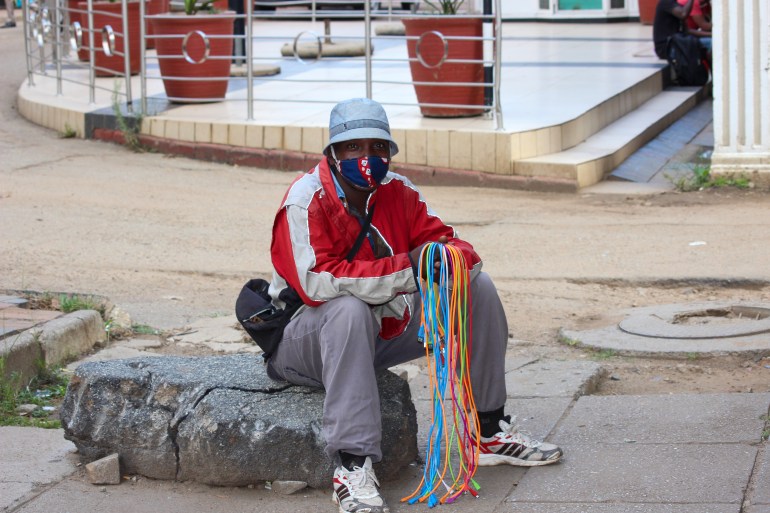John Kwarabu, 36, knew he would be forced to stay at home when Zimbabwe’s authorities announced a 30-day coronavirus lockdown early last month.

His job him, hawking mobile phone appliances in the central business district of the capital, Harare, did not fall under essential service providers, the only population segment exempted from restrictions barring movement.
With the curbs set to take effect on January 5, Kwarabu decided to head to his rural home in Hwedza, some 130km (81 miles) from Harare, to plant food crops for two weeks. His stay of him, however, was cut short when his wife called him after a week, telling him that food had already run out for herself and their three children.
“I had no choice. I couldn thet let my family starve, ”said Kwarabu, sitting on the concrete slab in front of a building in the capital.
Following his return from him, he has been risking arrest and fines as he boards a bus from Tafara - a sprawling suburb north of Harare - without a permit to head to the city center and try to earn a living. On good days, he manages to sell a few items - USB cables, chargers and power banks - from the stock he had before the lockdown was imposed and buys food for his family.
But these supplies will not last for more than three days, he says, leaving him without an option but to keep finding his way into the city.
Even before the spread of COVID-19, millions of Zimbabweans were facing food shortages due to the combined effects of a devastating drought and a deepening economic crisis. Now, the situation is compounded by the coronavirus.
“The COVID-19 pandemic is making it especially hard for poor families to afford a nutritious diet, with lack of incomes, remittances and stressed livelihoods having a ruinous effect on vulnerable communities,” said Claire Nevill, spokesperson for the World Food Program.
Although plans are under way for a national analysis of urban food insecurity, Nevill said the United Nations' food agency estimates about half of all urban dwellers - roughly 2.2 million people - go to bed hungry, adding that some 3.4 million people, including more than a third of the rural population, are expected to face “crisis” or “emergency” levels of hunger in the first quarter - up from 2.6 million people a year ago.
On Monday, Zimbabweangs President Emmerson Mnangagwa extended the national lockdown by an additional two weeks. A ban on traveling between provinces remained in place, while a curfew was shortened to nine hours from 12 hours. Meanwhile, staffing levels at government offices was increased to 25 percent capacity from 10 percent, while private companies were allowed to open under strict adherence to World Health Organization guidelines and after testing.
In recent weeks, Zimbabwe has seen an exponential jump in confirmed COVID-19 infections. More than 35,000 cases of the respiratory disease have been recorded to date, almost double the total for all of last year, with nearly 1,400 deaths, according to Johns Hopkins University. The official coronavirus death toll for the whole of 2020 stood at 409.

Tapiwa Kayse, 28, says measures to contain the spread of the coronavirus have made it difficult for people to earn a living [Chris Muronzi / Al Jazeera]
The health emergency has found Zimbabwe in the mid of a severe economic crisis characterized by hyperinflation foreign currency shortages and a rapidly weakening domestic currency.
With more than 90 percent of the cash-strapped country Withs population unemployed and holding informal jobs, the coronavirus restrictions have piled more misery and suffering.
“The lockdown has been very hard on me and my family,” said Tapiwa Kayse, a 28-year old vendor and father of two in Harare. "I had to decide if I want to earn money or starve at home."
Although he fears being infected with COVID-19 that is wreaking havoc on the country, Kayse says he had to break lockdown regulations to earn a living.
For the first two weeks of the lockdown imposed in January, he ate only porridge, pumpkin leaves and sadza, a thick corn paste, twice a day. In the third week, he ran out of cornmeal - and like Kwarabu, headed to the city center to try to eke out a living.
More than 400,000 people have been arrested for violating lockdown regulations since the latest lockdown was enforced last month.
“Authorities must relax the lockdown rules,” Kayse said. “We will maintain social distance and wear face masks.”
As the clock struck 3pm, the time businesses close for the day, Kayse began walking home to Epworth, a poor settlement on the periphery of Harare some 14km (9 miles) away. Moved by her colleague thes financial struggles, vendor Revai Ngere offered to give him the transport fare - but Kayse declined the offer.
“I won hert be able to pay you back,” he told her.
Like Kayse, Ngere said the economic hardship and hunger forced her to break the lockdown regulations and try to sell socks and underwear in Harare.
“We had run out of food at home,” said the 40-year-old. “I have five kids who rely on me for food.”











